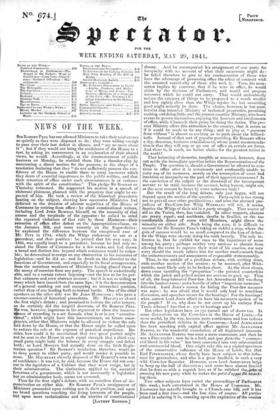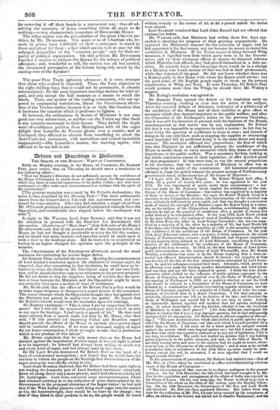NEWS OF THE WEEK.
SIR ROBERT PEEL has not allowed Ministers to take their misfortunes so quietly as they were disposed to do : they were willing enough
to pass over their last defeat in silence, and" say no more about it" ; but if they would not bring the confidence of the House to a test, by asking its concurrence in an explanation of their altered
-views, he would. Accordingly, at the commencement of public business on Monday, he startled them like a thunder-clap by announcing a direct motion for the purpose, in the shape of a resolution declaring that they "do not sufficiently possess the con- fidence of the House to enable them to carry measures which they deem of essential importance to the public welfare, and that /heir retention of office under such circumstances is at variance with the spirit of the constitution." This pledge Sir ROBERT on Thursday redeemed. He supported his motion in a speech of elaborate plainness, planned with the propriety that might be ex- pected of him. He took a review of the historical precedents bearing on the subject, showing how successive Ministries had deferred to the decision of adverse majorities of the House of Commons by retiring from office : he cited constitutional writers, including Lord JOHN RUSSELL himself, on the necessity of that course and the turpitude of the opposite : he called to mind the repeated violations of that rule by these Ministers—their retention of office after defeat on: the Appropriation-clause, on the Jamaica Bill, and more recently on the Sugar-duties : be explained the difference between the exceptional case of Mr. PITT in 1784, which the Whigs endeavour to use as a istecedent, and their position : he proved that his own case, in 1885, was equally inapt as a precedent, because he had only re- sisted the House of Commons for a few weeks, and had drawn a broad and distinct line beyond which resistance would be culpa- ble; he determined to resign on any obstruction to his measures of legislation—and he did so : and he dwelt on the disorder to the functions of Government, and especially to its fiscal arrangements, from the notorious weakness of Ministers having placed them at the mercy of coercion from any party. The speech is undoubtedly able, and to a certain extent imposing—not the less so for its per- fect calmness and even abstract manner : but it is not so telling as many which have issued from the same lips; it is the demonstration of a general marking out and occupying an intrenched position, rather than of one leading forth to instant battle. One of the chief speakers on the other side was Sir JOHN HOIIHOUSE ; who gave a counter-version of historical precedents. Mr. MacAtmar closed the first night's debate ; and promised to imitate the calm temper, as he certainly did the languid decorum, of Sir ROBERT PEEL. He was, however, ingenious in his argument to show the inconve- nience of recording in a set formula what is or is not "constitu- tional"; which might have this inconvenience, on future emer- gencies, either that Ministers might be allowed to violate the rule laid down by the House, or that the House might be called upon to enforce the rule at the expense of practical expediency. Be- sides, how could it be ascertained that two great parties might not be sent to the House in such equal strength that a third very small party might hold the balance in every struggle and defeat both ; as Lord HOWICK had actually done on the Irish Regis- tration question ? Sir ROBERT'S resolution, therefore, would go to deny power to either party, and would render it possible to none. Mr. Maceurar cleverly disposed of Sir ROBERT'S own test of confidence : it was not, he said, because the House did not con- cur in the legislation of a Cabinet that they must resign, but in their administration. The distinction, applied to the essential functions of a government, which is not necessarily a legislative but an administrative body, seems not unsound. • Thus far the first night's debate, with no resistless force of de- monstration on either side. Sir ROBERT PEEL'S arraignment of Ministers proceeded upon nothing new in their position, and upon no broad questions touching the living interests of the people, but upon mere technicalities and the niceties of constitutional
theory. And he accompanied his arraignment of one party for incapacity with no account of what their successors might do : be failed therefore to give to his condemnation of those who have the advantage of possessing office the effect of contrast with the assumed superiority of those who seek it. True, his accu- sation implies by converse, that if he were in office, he would abide by the decision of Parliament, and would not propose measures which he could not carry. That would undoubtedly reduce the category of things to be proposed to a much smaller and less sightly show than the Whigs rejoice in ; but something good might actually be done. The choice, however, is but poor, betwixt this intended Ministry of technical proprieties, promising nothing and doing little, and the present courtier Ministry, who leave events to govern themselves, enjoying the honours and emoluments of office, while Chance is their proxy for doing the duties. The pre- sent Ministry offers this attraction to the country, that it seems as if it could be made to do any thing ; and to play at " pressure from without" is almost as exciting as to push about the billiard- balls. Instead of that sort of popular gambling, Sir Rosser offers a dry, decorous, business establishment, whose grand recommenda- tion is that they will stay or go out of office on certain set forms. And there is, in sooth, no better choice for the greatest nation in the world!
That balancing of demerits, tangible or assumed, however, does not settle the immediate question before the Representatives of the People. The question is, should a Government be allowed to con- tinue in office after it is notoriously and confessedly unable to carry any of its measures, merely on the assumption of' some bad intention or incapacity on the part of their apparent successors ? Is the conviction of the culprit or the dismissal of the incompetept servant to be staid, because the accuser, being human, might err, or the next servant be beset by some unknown fault ?
But the result of the long debate, only just begun, will not depend upon the merits of the question. Party-spirit is too strong not to prevail over other predilections ; and even the alarmed pre- judices of Pro-Corn-law Whig WORSLEYS will not, it seems, deprive the Whigs of their aid in a party struggle. That source of aid to the Tories, then, has vanished. In other respects, chances are pretty equal; and accidents, deaths in families, or the too comfortable dinner of some wild Members, might throw the minority on either side. Such being the case it is difficult to • account for Sir ROBERT PrEr2s taking so riskful a step, where the gain of success would be so small compared to the loss of defeat: for the Whigs were already doing his work bravely. The only in- ference is, that he yielded for once to the impatience of some among his party ; perhaps neither very anxious to abstain front allowing the event to reprove their want of his caution, nor very sorry should the result relieve him for another twelvemonth from the embarrassments and annoyances of responsible statesmanship.
Thus, in the middle of a profitless debate, with nothing done, ends another section of the session ; to be resumed, after Whit- suntide, most likely only to be broken short. As the show closes, clown come tumbling the "properties "—the painted counterfeits which the jaded and pelted actors are anxious to pack up. First of all, the long-laboured Poor-law Act Amendment Bill was flung into the lumber-room ; and a bundle of other "important measures" followed. Lord Jons's reason for hiding the Poor-law measure was naive: he was afraid that it would only lead to resultless discussion, and speeches meant for the hustings! For the hustings! what, cannot Lord JOHN afford to have his measures spoken of to the people ? If so, why does he not cover up his embryo Free Trade scheme ? has that nc. eye to hustings uses ?
But other legislators have an eye turned out of doors too. In some discussions on the Corn-laws in the House of Lords —far more useful, by the way, because more continuous and less tedious than the periodical debates in the Commons,—Lord ASHBURTON has been speaking with capital effect against Mr. ALEXANDER BARING, to the wonderful consolation of all frightened interests. Mr. ALEXANDER BARING was once a mere commoner, and then he was a Free-trader : now he is a lord, and ipso facto the "commer- cial blood in his veins" has been converted into very aristocratical anti-commercial blood. One might take this as a capital specimen of the conservative influence of the House of Lords, but that Earl FITZWILLIAM, whose family have been subject to that influ- ence for generations, and who is a great landlord, is such a very wild Corn-law Repealer. However, even Lord ASHBURTON helps to keep up the ball of discussion ; and some have almost fancied that he does so with a roguish leer, as if he relished rre-ef amusing his new party while he makes the point (Tapp* hack% ing them. Two other subjects have varied the proceedings Parliament this week ; both entertained in the House of Commons. Mr. EASTHOPE has actually brought in a Church-rate bftl, and it has been read a first time—and the last time of course./ All parties joined in ushering it in, counting upon the expirationOf the session
for removing it off their hands in a convenient way : thus all ad- mitting the necessity of doing something where all mean to do nothing,—a very characteristic procedure of Honourable House. The other matter was the presentation of the great Chartist pe- tition, by Mr. DeNcomna. The score or so of Chartists who re- main in prison have 1,300,000 of their countrymen to stand by them and plead for them : a fact which speaks well at once for the enlarged sympathies of the "common people" and for their ca- pacity of political organization. On this petition Mr. DUNCOMBE founded a motion to address the Queen for the release of political offenders ; and, wonderful to tell, the motion was all but carried, the threatened prerogative of the Crown being only saved by the casting-vote of the Speaker !



























